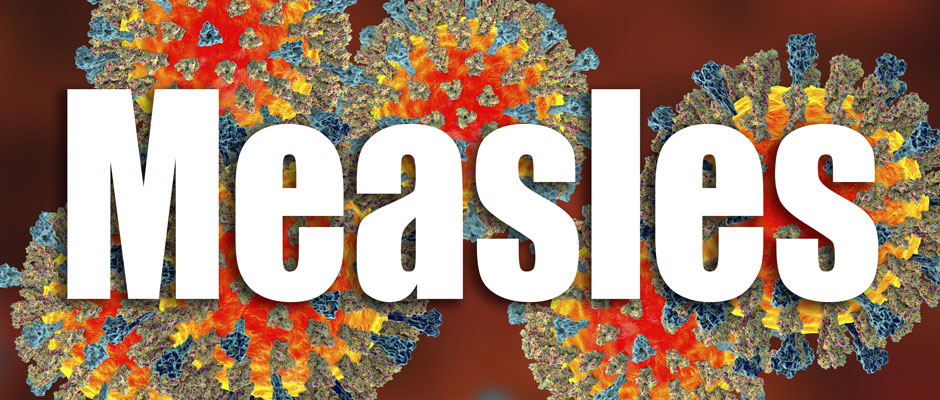Measles: Am I Protected?

Measles is a highly contagious virus that can be spread in public spaces without direct person-to-person contact. For those who aren’t immunized, 90 percent will develop measles if they are exposed to it. While death doesn’t often occur, other problems can develop such as diarrhea, pneumonia and encephalitis (a type of inflammation of the brain).
Why has the measles vaccine been in the news so much?
In recent years, some parents have decided not to give their children certain vaccines. This may be due to religious, personal or medical reasons. In general, as a community becomes protected from a disease, people begin to forget the devastating consequences that the disease once had. Over time, individuals start to believe a misconception that vaccines are not necessary and become lax in giving themselves and their children vaccines. As a result, fewer people in the community are immunized and this has led to an increase in measles cases.
Why does measles vaccination matter?
As fewer people are immune, our community becomes more susceptible to spreading the virus to anyone who is not vaccinated. Those who can’t receive the vaccine because of allergies or because they are too young to have received the entire series are at increased risk of developing measles. Having as many people as possible vaccinated in the community significantly limits the spread of the disease and helps protect the individuals that cannot receive the vaccine. To put it in perspective, between 2001 and 2013, 28 percent of children under 5 years of age had to be treated in the hospital for measles with long-term effects that include brain damage, deafness and even death.
Who should receive the measles vaccine?
- It is currently recommended that children receive two doses of the measles, mumps, and rubella (MMR) vaccine— between age 12-15 months and a second between 4-6 years of age.
- If you are an adult born before 1957, it is presumed that you are immune to measles and mumps, with the exception of health care workers.
- At least one dose of MMR should be given to adults born 1957 or later unless lab results indicate you are protected.
- Health care workers who don’t have lab evidence of immunity should receive two doses of the MMR vaccine at least 28 days apart.
Who should not receive the measles vaccine?
- Those with a severe allergic reaction to a previous dose of MMR or any of the vaccine’s components, including neomycin and gelatin.
- Those that are pregnant or attempting to get pregnant.
- Those with compromised immune systems.
Where can I get the measles vaccine?
- Those with commercial and Healthcare Exchange insurance can receive it at a pharmacy or doctor’s office at no cost.
- State of Wisconsin members must receive the vaccine at a doctor’s office (currently, vaccines are a medical benefit only).
- Medicare members can receive the vaccine at the pharmacy or doctor’s office—tier 3
- If given at a doctor’s office, the member must submit a manual claim to process it through Part D benefit.
- Free and low-cost health clinics also offer vaccines. Find a location near you.
If you have been in an area with a measles outbreak or you have been exposed to measles, recommendations may differ. If you have any further concerns about measles and whether you are protected, please reach out to your personal doctor to discuss further.



